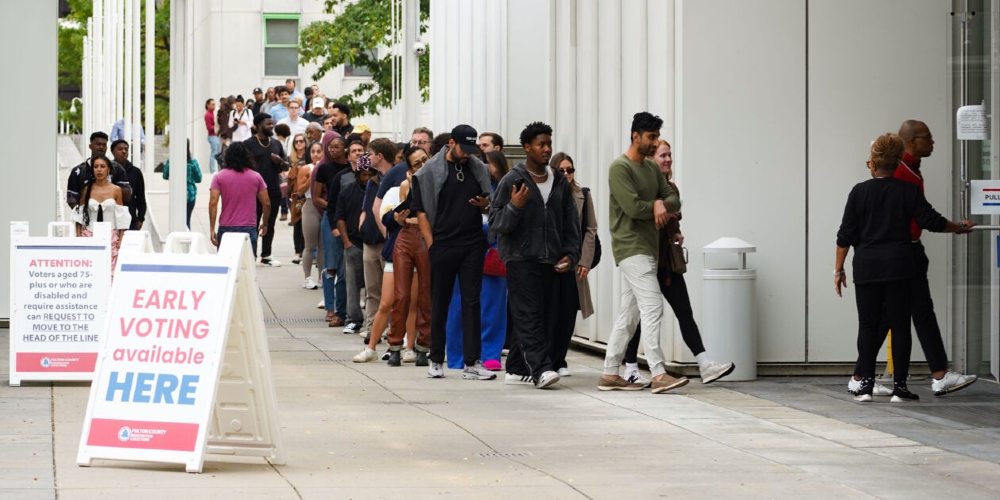(The Daily Signal)—Election Day is accompanied by some major voting controversies in battleground states, with lawsuits and investigations looking into alleged voter registration fraud, overseas ballots, and complaints about how some jurisdictions follow election law.
Both Democrats and Republicans brought lawsuits.
Some matters already have been settled. For example, the U.S. Supreme Court sided last week with Virginia by allowing the state to remove the names of 1,600 noncitizens from the voter rolls. And in Pennsylvania, Republicans successfully sued to extend early voting hours.
However, courts tossed other election cases on procedural grounds or cases remain unsettled and could prompt arguments in close elections.
Here are eight issues to look out for, both on Election Day and after.
1. Voter Registration in Pennsylvania
At least four jurisdictions in Pennsylvania are investigating potential voter registration fraud.
State prosecutors in Pennsylvania’s Lancaster County are investigating two batches of about 2,500 voter registration forms that may include several hundred fraudulent forms.
As of Monday afternoon, the Lancaster County District Attorney’s Office had determined that 17% of the forms were fraudulent. Another 57% were determined to be legitimate, WPMT-TV (Fox 43) reported. The rest were still being investigated.
York County officials also are investigating potential voter registration fraud. Of a batch of 3,087 forms, about 24% were declined after being found to be duplicate requests.
York County also is reviewing challenges to 350 overseas mail-in ballots.
And the Monroe County District Attorney’s Office last week identified fraudulent voter registration forms. A specific number wasn’t given and the investigation continues, the Pocono Record reported.
Berks County also referred two potential voter registration violations for investigation.
Pennsylvania Attorney General Michelle Henry, a Democrat, said attempts to submit fraudulent voter registration forms in the four counties “have been defeated.” Henry said her office is working with local law enforcement.
“While we will not be divulging sensitive information about these investigations, we want to clarify that the investigations regard voter registration forms, not ballots,” Henry said in a public statement, adding later: “The investigations are ongoing, and offenders who perpetrated acts of fraud will be held accountable under the law.”
2. Undelivered, Duplicate Ballots
In Erie County, Pennsylvania, Democrats sued over a debacle concerning absentee ballots.
Judge David Ridge ruled Friday that Erie County must offer a new set of absentee ballots to almost 20,000 voters who didn’t receive them. The state judge also said the county would have to stay open longer office hours until Election Day.
The vendor wasn’t able to confirm the status of between 13,000 and 17,000 absentee ballots requested by Erie County residents before the deadline, USA Today reported. In addition, 1,200 county residents who said they would be out of town requested absentee ballots. On top of that, 365 duplicate ballots were sent to voters.
3. Overseas Mail Ballots
Republicans lost three federal lawsuits regarding a law called the Uniformed and Overseas Citizens Absentee Voting Act, which governs how Americans living overseas can vote in federal elections.
The GOP lawsuits over UOCAVA focused largely on nonmilitary overseas voters, many of whom indicated no intention to return to the United States.
Six Republican members of the U.S. House sued Pennsylvania over the state’s counting procedures. The GOP lawmakers’ complaint says that about 15,000 nonmilitary American voters living abroad but casting ballots in Pennsylvania elections should have to provide the same personal identification as Pennsylvania residents.
But U.S. District Judge Christopher Conner determined last Tuesday—one week before Election Day—that an injunction could “upend the commonwealth’s carefully laid election administration procedures to the detriment of untold thousands of voters.”
Michigan Court of Appeals Judge Sima Patel ruled against the Republican National Committee’s challenge to rules in the U.S. law. The RNC challenge was based on nonresidents’ dependents who live abroad voting in state elections. Patel ruled that the GOP lawsuit was an attempt to “disenfranchise” voters.
Similarly, North Carolina Superior Court Judge John Smith ruled that the RNC challenge “presented no substantial evidence” of fraudulent voting.
4. 218,000 Arizona Voters With No Proof of Citizenship
Arizona state Judge Scott Blaney last week ordered the office of Arizona Secretary of State Adrian Fontes, a Democrat, to release the names of voters who were misclassified as not being required to show proof of U.S. citizenship, The Associated Press reported.
Fontes initially said that the number of misclassified voters was thought to be 98,000 registered voters who lacked proof of citizenship and thus could not vote in state and local elections. However, a revised estimate put the number more than twice as high, at 218,000 voters who lacked proof of citizenship when registering to vote.
Arizona state officials contend that a coding glitch caused the problem. Arizona law requires proof of U.S. citizenship for voting in state and local elections, but not in federal elections. The concern is that the 218,000 voters without proof of citizenship could vote in state and local elections because of the glitch.
Arizona state law requires proof of citizenship for voting only in state and local elections, not federal elections such as for president or Congress. The National Voter Registration Act of 1993 prevents a state from imposing proof-of-citizenship requirements for federal elections.
So, Arizona voters lacking proof of citizenship would be able to vote in the presidential election, just as in any other state. However, these voters normally would not be allowed to vote in state and local elections in Arizona.
The total of 218,000 voters without proof of citizenship—who may vote in federal elections but not state elections—prompts concerns because federal law prohibits noncitizens from voting or registering to vote.
The America First Legal Foundation sued for the voter registration records.
Blarney, in his ruling, rejected Arizona’s contention that the information would provoke violence. He gave Fontes a deadline of noon Monday to release the names of the 98,000 misclassified voters.
5. Georgia Ballot Centers
The Trump campaign and the RNC sent letters over the weekend to county ballot processing centers, asserting the reopening of the offices was illegal.
The letters called for sequestering the ballots received after Nov. 1, Georgia’s deadline for receiving absentee ballots. The Republican National Committee filed a lawsuit as well.
The RNC contends that the Democrat counties of Chatham, Clark, Cobb, DeKalb, Fulton, and Gwinnett accepted Saturday in violation of Georgia law.
6. Nevada Postmarks
The Nevada Supreme Court last week determined that mail ballots that arrive three days after Election Day with no postmark will still be counted.
Nevada uses universal mail-in voting.
The state’s highest court rejected a challenge brought by the Republican National Committee, which argued that when a ballot lacks a postmark it’s difficult to know whether it really was sent before Election Day.
The court also determined that ballots with smudges and indecipherable writing would be counted.
7. Iowa and Noncitizen Voting
Although the U.S. Supreme Court rejected a Justice Department lawsuit against Virginia for removing the names of 1,600 noncitizens from the voter rolls, the United Latin American Citizens of Iowa sued Iowa’s Republican secretary of state, Paul Pate, and election officials from five counties over removal of noncitizens’ names.
Pate sent a list of 2,176 registered voters who were suspected noncitizens to local election officials in Iowa.
The plaintiffs filed their complaint Oct. 30. On Sunday, an Iowa judge denied the motion for a temporary restraining order or temporary injunction, and determined that the voter registrations would not be restored before Election Day.
The judge determined, however, that any individual would be allowed to cast a provisional ballot.
8. Unsent Mail Ballots in Georgia
In this case, the Democratic National Committee sued Cobb County, Georgia, alleging that the county’s Board of Elections failed to send mail-in ballots to more than 3,000 voters who requested the forms.
Georgia law requires elections offices to send ballots within three days of receiving a request. The deadline to receive a request was Oct. 25.
The elections board announced it didn’t get all ballots sent on time, and planned to send some by express shipping. However, Democrats, in their complaint in state court, contend that wasn’t sufficient since that’s not enough time to ensure ballots would be counted.
Democrats are suing to extend the deadline to receive ballots from Nov. 5 to Nov. 8.
What Would You Do If Pharmacies Couldn’t Provide You With Crucial Medications or Antibiotics?
The medication supply chain from China and India is more fragile than ever since Covid. The US is not equipped to handle our pharmaceutical needs. We’ve already seen shortages with antibiotics and other medications in recent months and pharmaceutical challenges are becoming more frequent today.
Our partners at Jase Medical offer a simple solution for Americans to be prepared in case things go south. Their “Jase Case” gives Americans emergency antibiotics they can store away while their “Jase Daily” offers a wide array of prescription drugs to treat the ailments most common to Americans.
They do this through a process that embraces medical freedom. Their secure online form allows board-certified physicians to prescribe the needed drugs. They are then delivered directly to the customer from their pharmacy network. The physicians are available to answer treatment related questions.




